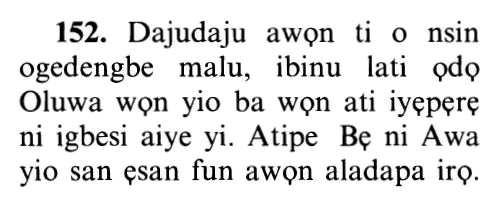7vs152
Select any filter and click on Go! to see results
إِنَّ الَّذِينَ اتَّخَذُواْ الْعِجْلَ سَيَنَالُهُمْ غَضَبٌ مِّن رَّبِّهِمْ وَذِلَّةٌ فِي الْحَياةِ الدُّنْيَا وَكَذَلِكَ نَجْزِي الْمُفْتَرِينَ
Inna allatheena ittakhathoo alAAijla sayanaluhum ghadabun min rabbihim wathillatun fee alhayati alddunya wakathalika najzee almuftareena
Index Terms
Click to play
Yoruba Translation

Hausa Translation
Lalle ne waɗanda suka riƙi maraƙin, wani fushi daga Ubangijinsu da wani walãkanci a cikin rãyuwar dũniya, zã su sãme su: Kuma kamar wancan ne Muke sãka wa mãsu ƙirƙira ƙarya.
Asbabu n-Nuzuul (Occasions of Revelation)
Allah tells;
إِنَّ الَّذِينَ اتَّخَذُواْ الْعِجْلَ سَيَنَالُهُمْ غَضَبٌ مِّن رَّبِّهِمْ وَذِلَّةٌ فِي الْحَياةِ الدُّنْيَا ...
Certainly, those who took the calf (for worship), wrath from their Lord and humiliation will come upon them in the life of this world.
The `wrath' mentioned here that struck the Children of Israel because of their worshipping the calf, means, Allah did not accept their repentance until some of them [who did not worship the calf (killed others) who worshipped the calf]. We mentioned this story in Surah Al-Baqarah,
فَتُوبُواْ إِلَى بَارِئِكُمْ فَاقْتُلُواْ أَنفُسَكُمْ ذَلِكُمْ خَيْرٌ لَّكُمْ عِندَ بَارِئِكُمْ فَتَابَ عَلَيْكُمْ إِنَّهُ هُوَ التَّوَّابُ الرَّحِيمُ
So turn in repentance to your Creator and kill yourselves (the guilty), that will be better for you before your Creator.'' Then He accepted your repentance. Truly, He is the One Who accepts repentance, the Most Merciful. (2:54)
As for the humiliation mentioned in the Ayah, it pertains to the disgrace and humiliation that the Jews suffered in the life of this world.
Allah's statement,
... وَكَذَلِكَ نَجْزِي الْمُفْتَرِينَ ﴿١٥٢﴾
Thus do We recompense those who invent lies!
is for all those who invent an innovation (in religion).
Surely, the disgrace resulting from inventing an innovation (in religion) and defying Allah's Message, will be placed in the heart and from there on to the shoulders.
Al-Hasan Al-Basri said;
"The disgrace of innovation will weigh on their shoulders even if they were to gallop on their mules or trot on their work horses.''
Ayub As-Sakhtiyani narrated from Abu Qilabah Al-Jarmi that he commented on this Ayah, وَكَذَلِكَ نَجْزِي الْمُفْتَرِينَ (Thus do We recompense those who invent lies),
"By Allah! This Ayah is for all those who invent a lie, until the Day of Resurrection.''
Also, Sufyan bin Uyaynah said,
"Every person who invents a Bid`ah (innovation in the religion) will taste disgrace.''
Allah tells His servants that He accepts repentance from His servants for any sin, even Shirk, Kufr, hypocrisy and disobedience.
أما الغضب الذي نال بني إسرائيل في عبادة العجل فهو أن الله تعالى لم يقبل لهم توبة حتى قتل بعضهم بعضا كما تقدم في سورة البقرة " فتوبوا إلى بارئكم فاقتلوا أنفسكم ذلكم خير لكم عند بارئكم فتاب عليكم إنه هو التواب الرحيم " وأما الذلة فأعقبهم ذلك ذلة وصغارا في الحياة الدنيا وقوله " وكذلك نجزي المفترين " نائلة لكل من افترى بدعة فإن ذل البدعة ومخالفة الرشاد متصلة من قلبه على كتفيه كما قال الحسن البصري : إن ذل البدعة على أكتافهم وإن هملجت بهم البغلات وطقطقت بهم البراذين . وهكذا روى أيوب السختياني عن أبي قلابة الجرمي أنه قرأ هذه الآية " وكذلك نجزي المفترين " فقال هي والله لكل مفتر إلى يوم القيامة . وقال سفيان بن عيينة كل صاحب بدعة ذليل ثم نبه تعالى عباده وأرشدهم إلى أنه يقبل توبة عباده من أي ذنب كان حتى ولو كان من كفر أو شرك أو نفاق أو شقاق ولهذا عقب هذه القصة .
"إن الذين اتخذوا العجل" إلها "سينالهم غضب" عذاب "من ربهم وذلة في الحياة الدنيا" فعذبوا بالأمر بقتل أنفسهم وضربت عليهم الذلة إلى يوم القيامة "وكذلك" كما جزيناهم "نجزي المفترين" على الله بالإشراك وغيره
الغضب من الله العقوبة .
I'raab - grammatical analysis of the Qur'an
«إِنَّ» حرف شبه بالفعل.
«الَّذِينَ» اسم موصول في محل نصب اسم إن.
«اتَّخَذُوا الْعِجْلَ» فعل ماض وفاعل ومفعول به والمفعول الثاني محذوف أي اتخذوا العجل إلها ، والجملة صلة الموصول لا محل لها.
«سَيَنالُهُمْ غَضَبٌ» فعل مضارع ومفعوله وفاعله والسين للاستقبال والجملة في محل رفع خبر إن.
«مِنْ رَبِّهِمْ» متعلقان غضب.
«وَذِلَّةٌ» عطف.
«وَذِلَّةٌ فِي الْحَياةِ» متعلقان بذلة.
«الدُّنْيا» صفة مجرورة بالفتحة المقدرة على الألف.
«وَكَذلِكَ» الكاف حرف جر ، ذا اسم إشارة في محل جر والجار والمجرور متعلقان بمحذوف صفة لمفعول مطلق : نجزي المفترين جزاء كائنا كذلك الجزاء.
«نَجْزِي» مضارع مرفوع بالضمة المقدرة والفاعل مستتر تقديره نحن.
«الْمُفْتَرِينَ» مفعول به منصوب وعلامة نصبه الياء ، والجملة مستأنفة.
